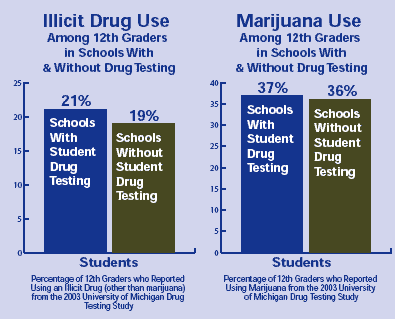Sound like some kind of perverse pedophiliac pecuniary pursuit? No, it’s the President of the United States, putting forth the notion that the world will be a better place if we spend $23 million to force children to pee in a cup.
Stupid.
If you really feel you have to spend that money, you’d be better off giving each state $460,000 to put into after-school programs. It may not seem like much, but heck, the way budgets are today, some schools would be happy with $20 to buy a couple of basketballs.
But the President has spoken, and you can be sure there will be a push for drug testing in schools across the country. After all, there’s federal money to be had! Who cares if drug testing doesn’t work?

Fortunately, Drug Policy Alliance and the ACLU have stepped up to the plate with Making Sense of Student Drug Testing: Why Educators Are Saying No (pdf — also available here), written by Fatema Gunja, Alexandra Cox,
Marsha Rosenbaum, PhD and Judith Appel, JD
Here’s a segment:
Comprehensive, rigorous, and respected research shows that there
are many reasons why random student drug testing is not good
policy:
- Drug testing is not effective in deterring drug use among young people;
- Drug testing is expensive, taking away scarce dollars from other, more effective programs that keep young people out of trouble with drugs;
- Drug testing can be legally risky, exposing schools to potentially costly litigation;
- Drug testing may drive students away from extracurricular activities, which are a proven means of helping students stay out of trouble with drugs;
- Drug testing can undermine relationships of trust between students and teachers and between parents and their children;
- Drug testing can result in false positives, leading to the punishment of innocent students;
- Drug testing does not effectively identify students who have serious problems with drugs; and
- Drug testing may lead to unintended consequences, such as students using drugs that are more dangerous but less detectable by a drug test, and learning the wrong lessons about their constitutional rights.
There are alternatives to drug testing which emphasize education,
discussion, counseling, extracurricular activities, and
build trust between students and adults.
The pamphlet then goes on to explain each of these points in detail, with facts, studies, quotes from educators and much more.
Read the whole thing, and then pass it on to your K-12 teachers, bring it to the PTA, send it to the school board, offer it to your newspaper, involve your city council.
If we aren’t proactive, very soon we will be teaching our children a bad lesson: that their rights don’t matter. And for what? An expensive program that doesn’t work.


